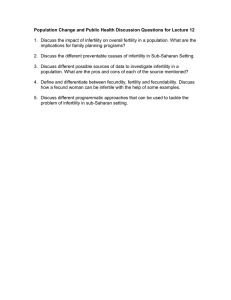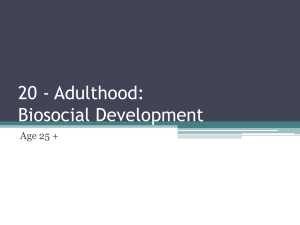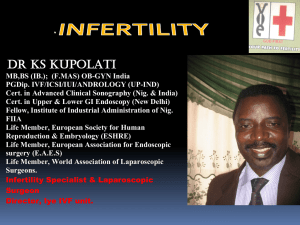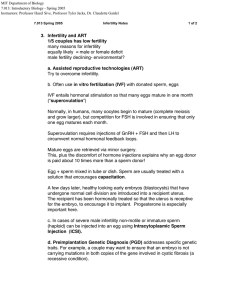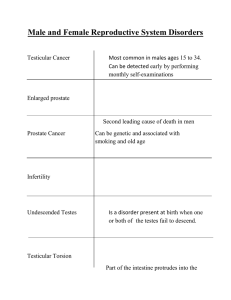Male Infertility: Challenges & Treatment - Binh Dan Hospital
advertisement
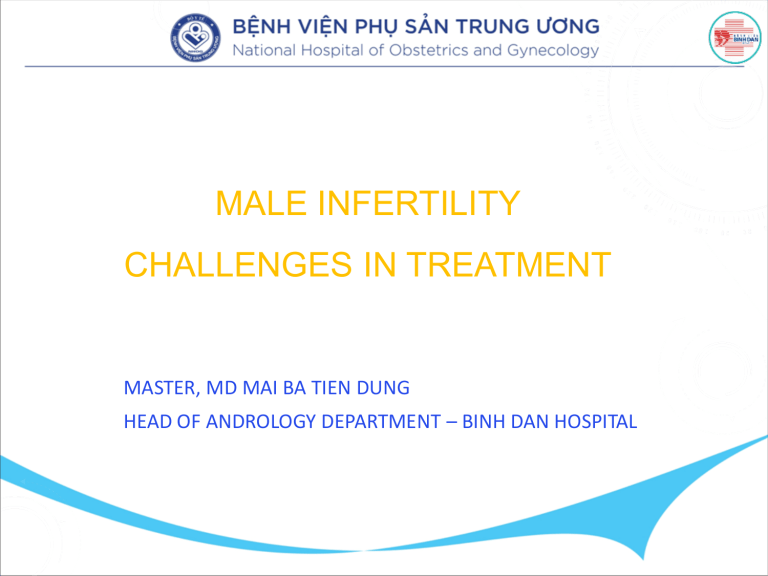
MALE INFERTILITY CHALLENGES IN TREATMENT • MASTER, MD MAI BA TIEN DUNG • HEAD OF ANDROLOGY DEPARTMENT – BINH DAN HOSPITAL 1 INTRODUCTION • Infertility: 15% in the community – 14% of causes of infertility are azoospermia. • Vas deferens, epididymis interventional surgery failure permanent infertility. • 1992: Palermo performed ICSI (intracytoplasmic sperm injection) Male infertility can be treated with in vitro fertilization (IVF). • 1998: Tu Du hospital performed ICSI with sperms in semen. • 1992: Prof. Ngo Gia Hy and MD Nguyen Van Hiep have laid the foundation for andrology in Binh Dan hospital • 1999: Binh Dan hospital andrology clinic was established • 2004: Viet Duc hospital andrology center 1. World Health Organization (2000),Cambridge: Cambridge University Press. 2. 3. 4. Palermo G, Joris H, Deroey P (1992), Lancet Ho Manh Tuong et al (2000), Medical and pharmaceutical news Nguyen Thanh Nhu et al (2002), Medical and pharmaceutical news => Male infertility is interested and treated actively 2 DEFINITION OF INFERTILITY •Pregnancy opportunity in normal couples Spira, 1986): •20-25% in 1 month •75% in 6 months •90% in 1 year •WHO: Couples, after one year marriage, do not apply family planning measures but still do not have children = infertility. •Causes: wife (40%), husband World Health Organization. WHO Manual for the Standardised Investigation, Diagnosis and Management of the Infertile Male. Cambridge: Cambridge University Press, 2000. (30%), both (20%) and 10% of unknown causes. ANATOMY OF TESTES • TESTES – EPIDIDYMIS: Endocrine and exocrine function. Testis has 250 – 300 lobules. Seminiferous tubules account for 90% of testicular volume. Epididymis: in the upper back, covering the testes. Head of epididymis: 6-8 tubes, body and tail of epididymis only have one tube. Figure 1.1: Longitudinal section of testes (Source: Hirsh AV, 1995) Reference: Rhoades RA, Bell RB. Medical Physiology: Principles for Clinical Medicine. Fourth ed. Philadelphia: Lippincott Williams & Wilkins, Wolters Kluwer; 2013. HYPOTHALAMUS – PITUITARY – TESTIS AXIS Hypothalamus Pituitary Testis GnRH FSH Sperm Inhibin LH T Sertoli cell Leydig Seminiferous tubule cell Aromatase 5 reductase Estradiol DHT T=testosterone GnRH=Gonadotropin-releasing hormone; FSH= Follicle-stimulating hormone; LH = Luteinizing hormone; DHT: dihydrotestosterone 10 CAUSES OF MALE INFERTILITY Classification Percentage % Testicular varicose veins Unknown causes Obstruction Occult testes Testicular failure Antibody to sperm Ejaculation disorder Endocrine WHICH SPECIALIZED DOCTOR WILL HELP PATIENTS? Gene abnormalities Testicular torsion Erectile dysfunction Testicular cancer Systemic diseases Low urethra Nieschlag E. Andrology (Eds), Male reproductive health and dysfunction, 2nd Ed. Springer Verlag, Berlin, MALE INFERTILITY is NOT HOPELESS 12 WE JUST DEAL WITH IT KNOWLEDGE AND BEHAVIOR OF SEEKING MALE INFERTILITY EXAMINATION AND TREATMENT SERVICES AT ANDROLOGY DEPARTMENT OF HO CHI MINH CITY BINH DAN HOSPITAL AND SOME INFLUENCING FACTORS Topic title Expected results The popularity of male infertility Doctors’ assessment on the popularity of male infertility. Patient knowledge of male infertility Patient knowledge about male infertility: causes, symptoms and possibility of treatment. Effects of male infertility on the patient itself and his family. Doctors’ assessment on patient knowledge relating to male infertility. Patient knowledge on places where provide male infertility examination and treatment services. What sources patients Education information, know information. communication about male Patient knowledge on male infertility communication activities that the patient has received previously: content and form infertility for patients of communication, effectiveness of changing the patient's behavior. Doctors's knowledge on actual status and effectiveness of communication programs for infertility patients today. Patient knowledge on whether to go for male infertility examination and treatment early or late, reasons. Medical facility - where patients choose for first treatment of male infertility and reason of choice. Thoughts, inmost Male infertility examination and feelings before deciding to go to Binh Dan Hospital for inpatient treatment. treatment Doctors' knowledge on the effectiveness of current male infertility regimen ; Common difficulties during treatment arising due to improper treatment for patients before hospitalization. Factors supporting patients to Factors that prevent patients from going for infertility examination and treatment. How to overcome these factors. make decision to select Binh Dan Supportive role of family, friends, relatives hospital to treat male infertility due Role of local health facilities to varicocele. Internet impact, how do the media change patient perceptions. Characteristics Percentage (%) ≤ 5 years 38.3 > 5 years 61.7 Primary 82.5 Secondary 17.5 Consulted by medical Have been consulted 11.0 staffs on male intertility Not yet consulted 89.0 Friends, relatives 48.7 Internet 35.7 Television, newspapers, radio 11.0 Traditional medicine practitioners 3.2 Medical staffs in communes, wards 1.9 Medical staffs in hospitals 1.9 Herbalist, fortune-teller 0.6 Duration of infertility Status of infertility Sources of information on male infertility Leaflets, posters Other sources 0 5.8 Table 3.2. Some epidemiological characteristics of study subjects Table 3.3. Understand the diagnostic criteria for male infertility in late time having children Period enough for diagnosis of male infertility 6 months Percentage Percentage (%) 14.9 1 year 9.1 2 years 14.9 Over 2 years 33.1 Unknown 27.9 “Infertility is due to women, every man thinks so.” PVS NB1. “I often see infertility in women, seeing in men when paying attention” PVS NB2. “Often the causes of infertility are due to more women than men. Men have infertility who experienced the bad luck” PVS NB5. Table 3.11. Practical selection of male infertility treatment facility for the first time Facility for male infertility treatment for the first time Home-remedy facility Percentage (%) 26.5 Private infertility clinic 17.9 Hospital has andrology department 17.2 Province/city hospital 13.9 Traditional medicine facility 11.3 Herbalist 7.3 Communes, wards, towns health stations 1.3 Other options 1.3 No response 5.3 Near the house Know previously Trust Information confidentiality Random Quick Cheap Other reasons Percentage % Table 3.12. Number of infertility treatment facilities that patients have experienced Number of infertility treatment facilities that patients have experienced Percentage (%) 1 to 2 facilities 43.6 3 - 5 facilities 46.1 Over 5 facilities 4.5 Does not remember 5.8 Home-remedy facility Private clinic Traditional medicine facility Province/city hospital Herbalist Hospital has andrology specialty Other facilities No response Communes, wards, towns health stations Percentage % Table 3.3. Reasons that male infertility patients do not go to Binh Dan hospital from the beginning Difficulties when accessing services Percentage (%) Lack of information about Binh Dan Hospital 38.3 House is far from hospital 23.4 Patients are crowded, waiting a long time 14.3 High cost of treatment 7.8 Not yet consulted for clear understanding of male infertility 6.5 Have been consulted Patients are not enough confident to go to hospital for male infertility treatment 1.9 Not yet consulted Total 100 “I have never been consulted about male infertility before.” PVS NB4. “I have not been consulted about this disease.” PVS2. “Often the causes of infertility are due to more women than men. Men have infertility who experienced the bad luck” PVS NB5. Easy, quick Normal Difficult Comment on possibility of access to male infertility treatment services at Binh Dan Hospital 2. Some factors affecting the behavior of seeking male infertility services •Factors of each individual patient: lack of information about medical facilities that are capable of treating male infertility (38.3%), lives far from hospital (23.4%), anxiety to wait a long time (14.3%), lack of treatment expense (7.8%). •Patients lack support from the reproductive health care system, especially at the primary level, so they do not receive necessary information and psychological support leading to disorientation of treatment. The proportion of patients who have been consulted was 11%. •The cost of infertility treatment in hospitals is high, the pressure of having to give birth prematurely to keep family happiness, to maintain the lineage makes it easy for patients to trust and accept unscientific treatments. – Binh Dan Hospital is a good facility for male infertility treatment but the hospital overload reduces the ability to attract patients due to lack of privacy, long waiting time. OVERCOME • Role of media • Reform the health system • Improve knowledge • Treat couples • Co-ordinate with infertility specialists - andrologists • Evaluate treatment under an overall picture Classification Percentage % Testicular varicose veins Unknown causes Obstruction TREATMENT ? Occult testes Testicular failure Antibody to sperm Ejaculation disorder Endocrine Gene abnormalities Testicular torsion Erectile dysfunction Testicular cancer Systemic diseases Nieschlag E. Andrology (Eds), Male reproductive health and dysfunction, 2nd Ed. Springer Verlag, Berlin, • Causes of male infertility Infertile men with unknown cause have high concentrations of ROS - Pathology and injury Reduced sperm quality Very high concentrations of ROS are found in men 25-40% of infertile • ROS (Reactive oxygen Species) The destruction of biological macromolecules by ROS and RNS is the cause of many dangerous diseases • Regulate cell division • Activate transcription factors • Regulate the expression of genes coding for antioxidant enzymes FREE OXIDATIVE RADICALS *(Favier, 2003; Pincemail & cs., 1998; Pincemail, 2006) **(Favier, 2003; Pincemail & cs., 1998). • DNA mutation • Protein denaturation • Lipid oxidation • Antioxidants Antioxidants are compounds that can slow down, prevent or reverse the oxidation of compounds contained in the body cells*. ANTIOXIDANTS Internal ANTIOXIDANT ENZYMES • • • • Ferritin Transferrin Albumin Heat shock proteins • Superoxide dismutase • Glutathion peroxydase • Catalase External Vitamin C • • • Vitamin E Vitamin E Vitamin C Carotenoids and phenolic compounds** *Jovanovic và Simic, 2000; Lachman & cs., 2000; Singh và Rajini, 2004). **Niki & cs., 1995; Lachman & cs.,2000; Pincemail & cs., 1998; Vansant & cs. 2004). • ROS & RNS – Formation causes and impacts RADIOACTIVE MATERIALS METABOLISM PROCESS Emissions SUFFERING FROM INFLAMMATORY DISEASES White blood cells UV rays ENVIRONMENTAL POLLUTION • Effects on fertilization process FREE OXIDATIVE RADICALS Ảnh hưởng xấu Bad effects Vitamin B2, B3 Vitamin C Phục hồi Recover ANTIOXIDANTS Vitamin E FERTILIZATION PROCESS Hoa men bia Yeast flower Sperm production Testosterone concentration Hughes et al. 1998; Balercia et al. 2004; Greco et al. 2005; Piomboni et al. 2008;Ghanem et al. 2010; Wang et al. 2010; Zini et al. 2010; Moslemi and Tavanbakhsh, 2011; Chen et al. 2012; Safarinejad, 2012; Walczak-Jedrzejowska et al. 2013; Durairajanayagam et al.2014; Haghighian et al. 2015; Thakur et al. 2015]. Sperms are affected by ROS during growth, storage and fertilization processes 7,8,9,10 78 ngày days GiaiFormation đoạn hình phase thành: Storage days Lưu trữ:14 ngày Fertilization SPERMS MAY BE AFFECTED BY ROS/RNS Deformati on Reduced count Motility Reduced sperm count & quality Sperm DNA damage Reduced conception rate • Why are sperms prone to oxidation? Contains significant ability to generate free radicals. Inability to repair the cell membrane. Contains high concentration unsaturated fats (PUFAs) Enzyme levels helping to maintain cytoplasm are very limited. • Characteristics of sperms damaged by ROS Increase the viscosity of semen High white blood cells in semen Poor motility Deformed sperms Low conception ability • Evaluation of sperm quality • Semen analysis Main diagnostic tool Semen analysis (at least 2 times) Evaluation Quality and count of sperms Sperm shape Reduced sperm count Sperm motility • Evaluation of sperm quality • Semen analysis WHO 2010 Pathology Semen volume 1.5ml Total sperm count 39 million Overall motility 40% Sperm concentration 15 million/ml Progressive motility 32% Asthenozoospermia Normal morphology 25% Teratozoospermia Vital sperm 58% pH value 7.2 Sperm shape deformity Oligozoospermia Reduced sperm count Sperm motility • Evaluation of sperm quality • DNA fragmentation assay Compromise male fertility Evenson et al 1980; Aitken 1999, Henkel et al 2004, Agarwal Int. Braz. J. Urol 2011) Predispose to genetic diseases, birth defects and childhood cancer (Fraga et al 1996, Ji et al/ Aitken et al 2003). DNA damage (DNA breakage) Recurrent pregnancy loss and poor outcomes in Intrauterine insemination (IUI) and in-vitro fertilisation (IVF) (Agarwal Int. Braz. J. Urol 2011) ROS – DF TEST RESULTS ROS: Moderate levels SDF = 20.33% TREATMENT OF REDUCED SPERM QUALITY • Anti-free radicals are becoming the most common treatment today for male infertility due to sperm abnormalities. • The process of fighting free radicals for sperm protection can be combined by: • Provides substances that help activate and restore the body's antioxidant enzymes such as Vitamin B2, Vitamin B3, Zn, Cu, Mn, Selenium. • Provides external antioxidants such as quercetin, xanthohumol, Vitamin C, Vitamin E Esteves and Agarwal, 2011 IMPORTANCE OF SPERM DNA PROTECTION IN IUI • Sperms with damaged DNA are more susceptible to attack than normal sperms when undergoing self-destruction during the period in the genital tract. • Sperms having intact genetic components have the opportunity to meet and fertilize eggs better. • The normal DNA preservation of sperms is an important factor for fertility when two spermatozoa are combined during spontaneous conception and IUI IMPORTANCE OF SPERM DNA PROTECTION IN IVF •There is an inverse correlation between sperm DNA damage levels and the development of embryo-fetus or trophocytes ( •The conception rate of women who undergo IVF reduces if her husband has high levels of sperm DNA damage (Li, 2006) •The rate of miscarriage in women using assisted reproductive measures increases twice if the sperm DNA damage is high. Eveson, 2006; Li, 2006; Taozzi, 2007) • Which solution is used for the sperm quality reduction ANTIOXIDANT ENZYMES ANTIOXIDANTS Conclusion: Treatment with micronutrients appears to be an option for improving sperm quality and consequently fertility, particularly in men with subclinical and low-grade varicocele, for whom surgical or interventional treatment are not indicated or where risks outweigh the benefits. Sperm DNA fragmentation index decreases after micronutrient supplementation Increased hyaluronic acid binding ability of spermatozoa indicates better maturity and morphology, as well as higher DNA integrity after micronutrient supplementation Trial setting Treatment group Control group Inclusion criteria subfertile men (> 1 year) with 2 pathological semen analyses Exclusion criteria Varicocele, aspermia, azoospermia and recent urogenital infections Parameter 67 men, median age 34 (18-43) 40 men, median age 38 (22-52) Treatment 2 capsules of Profortil/day for 3 months Lifestyle change for 3 months Lipovac M, et al.; EMJ Urology 2014 1:60-65. Results HBA Treatment group N = 67 Control group N = 40 100% 80% 60% 40% 20% 0% INITIAL AFTER INITIAL AFTER Data before and after treatment, compared to control group Distribution of density pre post HBA Binding in % Therapy group n=67 pre post HBA Binding in % Control group n=40 “This disease impacts both economically and mentally, family happiness is greatly affected. As a man, I should not say but my wife’s psychology is clearly not good. Sometimes I feel optimistic but sometimes I think there is no hope anymore.” PVS NB4. “Because of wanting to have children, someone - sometimes as friends, sometimes as our relatives, told me some places then I went immediately to there for treatment. After 5 years, I took home-remedies of a herbalist who lived nearly to my house for 6 months without results, then I also went to many other herbalists and traditional acupuncture clinics. The cost of each place was from 4 million to 50 million dongs.” PVS NB2. “Previously I saw in internet that there was a place where a home-remedy for infertility treatment was sold, its price was 10 million dongs per month. I took it without any results.” PVS NB1. “Based on my friends' instructions and verbal information, I found a herbalist who prescribed 5-6 packs of traditional medicines at a cost of several million dongs, but they did not have any effect. That place did not have a sign board and surely that it did not have a license.” PVS NB4. 48
